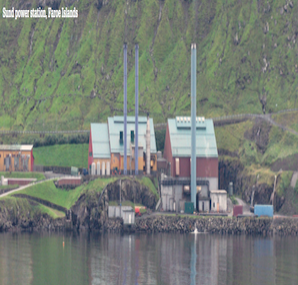MAN Diesel & Turbo is supplying four MAN 9L51/60 gensets to the Faroe Islands in the North Atlantic (an autonomous region of Denmark). The HFO-fuelled four- stroke engines, with selective catalytic reduction for NOx control, will expand the existing Sund power plant near the capital Tórshavn, providing both power and district heating.

MAN Diesel & Turbo is supplying four MAN 9L51/60 gensets to the Faroe Islands in the North Atlantic (an autonomous region of Denmark). The HFO-fuelled four- stroke engines, with selective catalytic reduction for NOx control, will expand the existing Sund power plant near the capital Tórshavn, providing both power and district heating.
End customer and operator of the power plant is SEV, the main power producer on the archipelago. In total, SEV operates 13 thermal and hydro plants on the islands as well as a number of wind farms. Since 2012, all power plants and many industrial- scale consumers have been linked to form a virtual power plant that automatically balances energy demand and supply on the islands. The new MAN engines will be used principally as a back-up for renewables.
EPC contractor for the Sund expansion project is BWSC of Denmark.
“As remote as the Faroe Islands may be, the setting up of the world’s first virtual power plant in 2012 was an energy industry milestone”, says Wayne Jones, chief sales officer, MAN Diesel & Turbo.
With a total electrical output of 37 MW, Sund is the largest of the three thermal power plants on the Faroe Islands. The new engines represent its third expansion phase. In the 1980s, BWSC and MAN boosted the capacity of the plant by 25 MW with two the addition of two engines.
Self-sufficient and yet stable power supplies are a basic essential for life in the middle of the North Atlantic triangle between Norway, Iceland and Scotland, notes MAN D & T, and while much of the power generated is already based on renewables, the harsh and extremely changeable climate represents a challenge for wind and hydro.
MAN Diesel & Turbo says its engines are proven for use in extreme climatic conditions as well as for fossil-fuel back-up of wind and PV. The company completed its first wind–diesel hybrid project, on the island of Bonaire, back in 2009.
